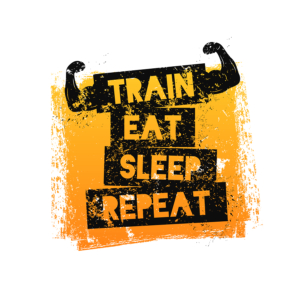Top Foods for the Best Sleep
By Chris Newport, MS, RDN/LDN, CISSN, EP-C

Sleep. Everyone needs it, whether we like it or not. As athletes, it’s the most effective method of recovery.
Remember, training is only effective with proper recovery.
Sleep Loss Can Make You Sick
In a recent article on sleep and athletic performance in the journal Sports Medicine, sleep loss promotes inflammation, leading to the degradation of the immune system. In other words, athletes consistently lacking their zzz’s are at increased risk of getting sick (particularly with upper respiratory tract infections like colds) or hurt (think anything that ends in “-itis” like plantar fasciitis, bursitis, etc).
But are there real foods or nutrition strategies that can help you get quality sleep?
First, let’s start with how sleep works.
The Path To Sleep
The body has a specific cascade of hormones in order to achieve quality sleep. Melatonin is a hormone made in the pineal gland, located just above the brain. It’s associated with sleep but also acts as an antioxidant. During the day, the pineal gland is inactive. When it’s dark outside (or inside), the pineal gland is turned “on” and begins to make melatonin (usually around 9pm), which decreases your alertness and encourages you to sleep (aka recover). In fact, daytime levels of melatonin aren’t even detectable. Lights from computer screens, TVs and phones will inhibit the release of melatonin.
Melatonin is synthesized by serotonin, a calming hormone that is derived from the amino acid tryptophan. While one may associate tryptophan with Thanksgiving turkey, it’s not well absorbed by the body if there are other protein sources and amino acids “competing” with it. But by eating carbohydrates, tryptophan can pass easily from the blood into the brain. In fact, as little as 4% protein in a carbohydrate meal can inhibit the proper ratio of tryptophan necessary to produce serotonin.
Tart Cherry Juice May Help Insomnia
Tart cherry juice is rich in melatonin. In one small study, subjects with chronic insomnia had mild symptom relief after drinking 2 cups of tart cherry juice per day. Recently, tart cherry juice has also been researched in athletes as a method to aid recovery following hard exercise. So try drinking a glass of tart cherry juice before bed. Or check out our Sweet Dreamzzz are Made of Cherries Smoothie.
Kiwi for Better Sleep
Don’t like cherries? Try some kiwi. One small study researched kiwifruit in people with mild sleep problems. After eating 2 kiwis 1 hour before bed for 4 weeks, participants fell asleep faster, slept longer, and woke up less. Seems like a pretty healthy, delicious and harmless strategy to try, right?
Magnesium For Relaxation
Also consider how much magnesium you get in your daily diet. Magnesium is an essential mineral important in over 300 functions in the body, including muscle relaxation and blood pressure regulation. Most people only get about 60-70% of the daily recommendations. Since magnesium is lost in sweat, athletes’ requirements of this mineral increases by 10-20%. Even a small deficiency impairs performance and intensifies the negative effects of heavy exercise, like muscle cramping and sleep disruption. Common food sources include pumpkin seeds, sesame seeds, almonds, spinach, swiss chard, and coconut water.
Be cautious with magnesium supplements (consult your healthcare provider first! Our dietitians can help!), as certain types can create unwanted side effects like loose stool.
Other Supplements for Sleep
Trytophan, valerian, and melatonin are common sleep aids. Always consult with your healthcare provider (again, our dietitians can help!) before taking these and they can be dangerous taken in the wrong doses or from poor sources.
Avoid These Foods for The Best Sleep
While certain foods and nutrients may benefit sleep, there are several that can make it worse.
Excess fluids, alcohol, fried foods, certain food preservatives, and heavy meals can disrupt quality deep sleep. Stimulants like caffeine from coffee, green tea or black tea as well as theobromine from cocoa and dark chocolate, and capsaicin from spicy peppers can also negatively affect sleep.
Interestingly, diets high in protein may improve sleep quality. High fat diets, like ketogenic diets, may negatively affect total sleep times. Excessive caloric restriction can also disturb sleep quality.
Quality Sleep = Improved Performance
So if you’re looking for a performance gain, consider some simple nutrition strategies for high quality sleep and the best recovery.



